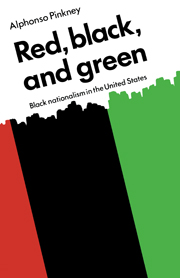Book contents
- Frontmatter
- Contents
- Preface
- 1 Introduction
- 2 The black nationalist tradition
- 3 Marcus Garvey and the Universal Negro Improvement Association
- 4 Malcolm X and the rise of contemporary nationalism
- 5 The impact of contemporary nationalism on the black community
- 6 Revolutionary nationalism: the Black Panther Party and other groups
- 7 Cultural nationalism
- 8 Religious nationalism
- 9 Educational nationalism
- 10 Black nationalism and liberation
- Epilogue
- Notes
- Index
6 - Revolutionary nationalism: the Black Panther Party and other groups
Published online by Cambridge University Press: 02 February 2010
- Frontmatter
- Contents
- Preface
- 1 Introduction
- 2 The black nationalist tradition
- 3 Marcus Garvey and the Universal Negro Improvement Association
- 4 Malcolm X and the rise of contemporary nationalism
- 5 The impact of contemporary nationalism on the black community
- 6 Revolutionary nationalism: the Black Panther Party and other groups
- 7 Cultural nationalism
- 8 Religious nationalism
- 9 Educational nationalism
- 10 Black nationalism and liberation
- Epilogue
- Notes
- Index
Summary
In the few years of its existence the Black Panther party has become one of the leading revolutionary nationalist organizations in the United States. Although some black nationalists maintain that it is not an authentic black nationalist group, the officials and rank-and-file members of the party have always considered their organization a nationalist one. The ideology of the party embraces some aspects of other revolutionary movements and ideologies, particularly Marxism–Leninism, but black unity and black autonomy are at the core of its platform and program. Furthermore, its cofounder, Huey P. Newton, has championed the cause of black self-determination from the outset. He viewed the party as the successor to Malcolm X's Organization of Afro-American Unity. The writings of black revolutionaries such as Malcolm X and Frantz Fanon were as crucial to the party's ultimate ideological position as those of Marx, Engels, Lenin, Mao, Ho, Guevara, and Debray. Furthermore, virtually every item in the party's platform addresses itself to the cause of self-determination for the black community. And although the Black Panthers are at odds with some aspects of black nationalist ideology, especially cultural nationalism, they have embraced some of the principles of cultural nationalism, particularly those of the Afro-American student groups.
Although the nationalism of the Black Panther party differs sharply from that of some of the other contemporary black nationalist groups, it is difficult to see how one could fail to acknowledge its preeminence as the leading revolutionary black nationalist group in the United States at the present time.
- Type
- Chapter
- Information
- Red Black and GreenBlack Nationalism in the United States, pp. 98 - 126Publisher: Cambridge University PressPrint publication year: 1976



